Given our current national political mood (I think “enraged and frothing” sums it up) I’ve spent the last few weeks thinking about what Quantum Leap had to say about America—and how the creators of Quantum Leap took a particularly weird subgenre of road trip show, and turned it into a blueprint for how America could live up to its potential.
TV Tropes has a name for a particular feel-good subgenre: “Woobie of the Week.” If I’m interpreting it correctly, these shows follow morally conscious do-gooders as they try to help a different downtrodden person (the “Woobie”) each week. They are a weird amalgamation of anthology show, road trip, and moral lesson, and they’re usually either strictly materialistic or overtly spiritual, and focused on local issues. Quantum Leap took the basic premise of the Woobie of the Week show, in which a downtrodden person is rescued by an outsider, and made it a far more visceral experience by merging the “Woobie” (downtrodden person) and the helper (Dr. Sam Beckett) into one character.
The pioneer of the Woobie subgenre was a 1960s anthology show called Route 66 which celebrated two things: American car culture and American diversity. At a time when most people lived their entire lives near their families, didn’t travel much, and dressed up for plane rides like they were going to the opera, Route 66 gave viewers two young men (clean-cut! Ex-military! No Beatniks here!) traveling the country in a cherry red convertible, learning about subcultures, and often helping people in need. While these people are occasionally haunted by larger issues (traumas from World War II, for instance) more often the guys stumble into standard-issue shady business deals, terminally ill women who want one last shot at romance, and, weirdly, dozens of violent revenge plots. The theme here was that America was great, full of life and culture to explore, and that sometimes individual Americans needed a hand.
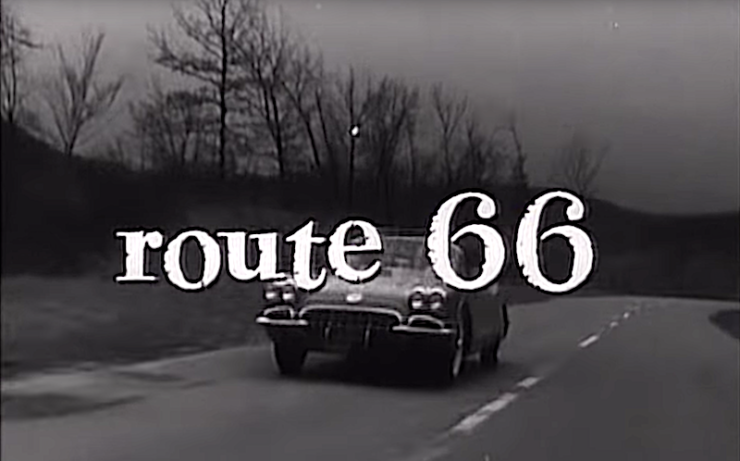
Fast forward a few years and you find a TV schedule flooded with shows meeting the basics of Woobieism: a third party with unique strength or perspective, who is often travelling the country, comes into town and helps an American in need. Some of the Woobie shows, like MacGyver, Knight Rider, and The A-Team, melded hero-of-the-week plots with ’80s action, while others like Starman and The Incredible Hulk used sci-fi elements to give their heroes extra powers. But as you watch these shows, you notice a giant departure from Route 66’s feel-good Americana, because often the trouble the heroes find is symptomatic of larger problems with the country. Cities are rife with drug abuse and corruption; small towns are held hostage by villainous factory owners. These gave way to two overtly religious Woobies, which took the traveling anthology show and made it cosmic: Highway to Heaven and Touched by an Angel. Both of these shows relied on the premise that God was using angels to intervene in human life—but normally, even with the addition of divine intervention, the problems were personal and domestic.
Despite its structural similarities to other Woobie shows, Quantum Leap used its airtime in a very different way. Even before the last-season network mandate to include more historical figures, QL looked back at the last 30 years of American history and said, What the hell? Shouldn’t we be doing better than this?
Sam did, of course, often leap into ordinary family situations—the boxer who needs to win a match to raise money for nuns, the pianist who has to help his girlfriend stand up to her controlling mother, the understudy who has to save an alcoholic actor from himself—but more often, his missions were involved in larger societal issues. When I look at Quantum Leap it’s easy to see problems: here’s this white man from the future who’s the only one who can help [insert oppressed group] overcome hardship; the [oppressed group member] is too weak to help themselves. I don’t think that’s the goal of the show, though. Instead, the goal is to force the guy who’s playing on the default setting of white, male, multi-doctorated, able-bodied, and (enthusiastically!) hetero to experience life through the prisms of racism, misogyny, and homophobia. It forces him to live life as a blind man, as a veteran in a wheelchair, as a man with schizophrenia, as a pregnant woman. It takes him right to the edge of being executed for a crime his host person is “guilty” of—but does any crime justify the terror he endures as a dead man walking?
Over the course of the show’s five seasons, the show tackled racism in general (“The Color of Truth”, “So Help Me God”, “Black on White on Fire”, “Justice”, “The Leap Between the States”); racism in the criminal justice system (“Unchained”, “Last Dance Before an Execution”); gender issues (“What Price Gloria”, “Another Mother”, “Miss Deep South”, “8 ½ Months”, “Southern Comforts”, “Raped”, “Liberation”); homophobia (“Running For Honor“); the rights of the differently-abled (“Blind Faith”, “Private Dancer”, “Jimmy”, “Nowhere to Run”); the rights of the mentally ill (“Shock Theater”); Native American rights (“Freedom”); immigration (“The Americanization of Machiko”, “All Americans”); and animal rights (“The Wrong Stuff”). It most often did this by placing Sam himself in the body of someone vulnerable to prejudice—with a few notable exceptions.
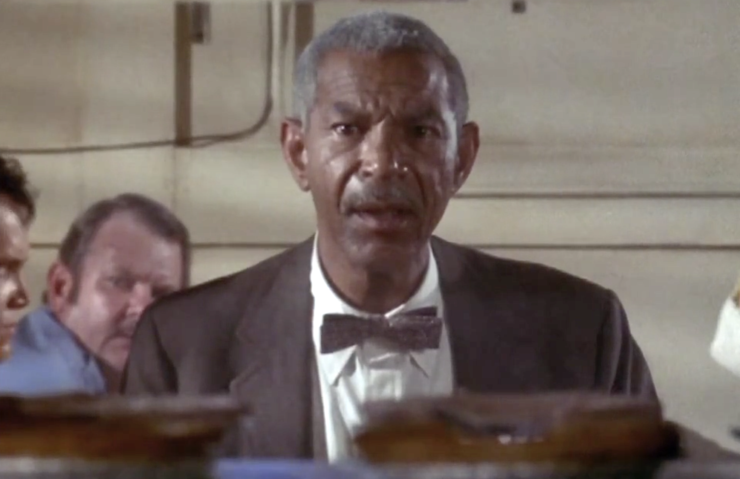
There are the many (many, many) episodes that grapple with racism. Most of the attempts to showcase Black life are in episodes set before or during the 1960s (which leads to unsettling implication that things are fine now) and rather than just portraying characters, as he could in other episodes, he had to stand in for “victims of racism” which could make for some extremely uncomfortable viewing.
Two episodes in particular show the strengths of the show’s conceit by riffing on classic movies to make their points. The first season episode “The Color of Truth” is a take on Driving Miss Daisy that actually outdoes its source material in portraying just how hellish Jim Crow-era life is. Where Miss Daisy features one elderly Jewish lady gradually learning about intersectionality in Georgia, Sam experiences the horror of segregation first-hand through the eyes of African-American Jesse Tyler. QL demonstrates what it can do best in a scene where Sam sits down at a ‘Whites Only’ lunch counter and only realizes a few moments later that he’s unintentionally desegregated a southern town. It would have been easy to leap Sam into a sympathetic white person, so he could stand back and try to help from a place of privilege; instead he has to live as Jesse Tyler, directly experiencing the racism and violence first-hand—and with Sam as our audience proxy, we experience it, too.
In the second season’s “So Help Me God”, Sam leaps into a white defense attorney defending a young African American woman accused of murder. In a fantastic undercutting of To Kill a Mockingbird, Sam comes to realize that his leapee is no Atticus Finch: every white person in town thinks his client is guilty, and Sam spends the entire episode justifying his respect for her to everyone from the judge to the leapee’s wife. Again, the show could have made the leapee the one liberal in a sea of racism; instead, Sam has to fight for his client knowing that even his host was against her.
Quantum Leap’s dedication to embodying issues is used to even greater effect when it look at gender. The show often used “tall hairy ungainly Scott Bakula looks hilarious in a dress” as an opening line. It was the joke that softened the viewer up before it used its unique Woobie-ism to twist the knife: since Sam physically becomes the people he helps, he is now subject to all of the sexual threat, or just sexual inconvenience, that his leapee is. Nearly all of the leaps into women use this to examine the question of whether biology is destiny.
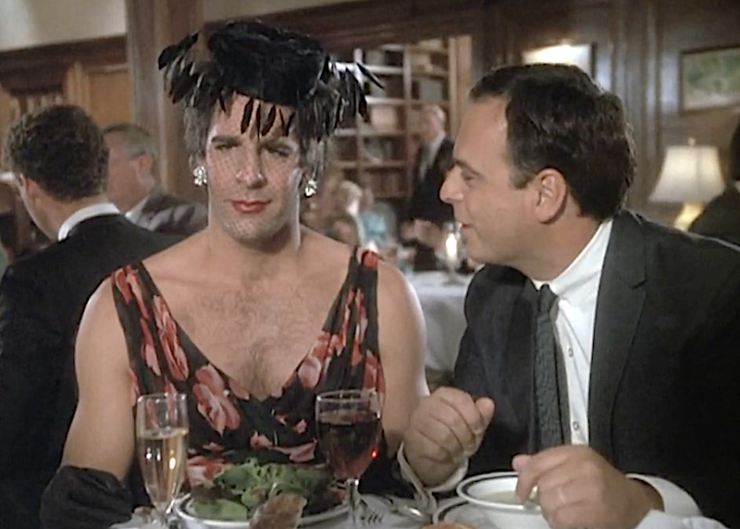
In “What Price Gloria?” and “Miss Deep South”, Sam leaps into two different young women in the 1960s who are trying to create independent lives for themselves. One woman, building a career in Detroit, is attempting to trade on her brains; the other, a beauty pageant contestant, wants to trade on her looks. In both stories everything comes down to sex, and these women’s futures hinge on the male gaze. In “8 ½ Months”, Sam doesn’t just swing into the 1950s to help out a pregnant teen—he becomes the pregnant teen, labor pangs and all, and faces all the sneering and discrimination that a young unwed mother would face—again, forcing the viewer to contemplate the same.
The place where they break with this indirect representation, thankfully, is an episode called “Raped,”set in 1980. This marks the only time that a leapee comes into the imaging chamber with Al, allowing her to tell her story without the mediation of Sam. The scene begins with Sam repeating his host’s words to describe the attacks, but as things get worse, the camera pushes in on her and Sam’s voice drops out. After spending most of the episode looking at Sam’s unharmed face, we watch the leapee give her testimony with a bruised and swollen features. Both Al and Sam step put of the way so that it’s a conversation between her and her female attorney, whom we later learn is also a rape victim. After several seasons of showcasing their unique ability to embody gender issues through Sam, they took a step back to center the attention on the leapee. In the earlier three episodes, the point is to look at how far American women have come, but rather than claiming that misogyny is in the past, it brought Sam into a more recent decade to look at victim blaming and rape culture, and show how far American society still has to go.
A hallmark of most of the Weekly Woobies was the idea that they were showing TV audiences pockets of America they may not have seen before. This was the mission statement of Route 66, and many of the shows that followed continued that structure of taking viewers to a different town each week. Following in those footsteps Quantum Leap usually chose to stay in America (which in itself is interesting since theoretically Sam could leap into anyone) but rather than simply repeat the older show’s travelogue aspects, the writers used a few of the leaps to interrogate what America means.
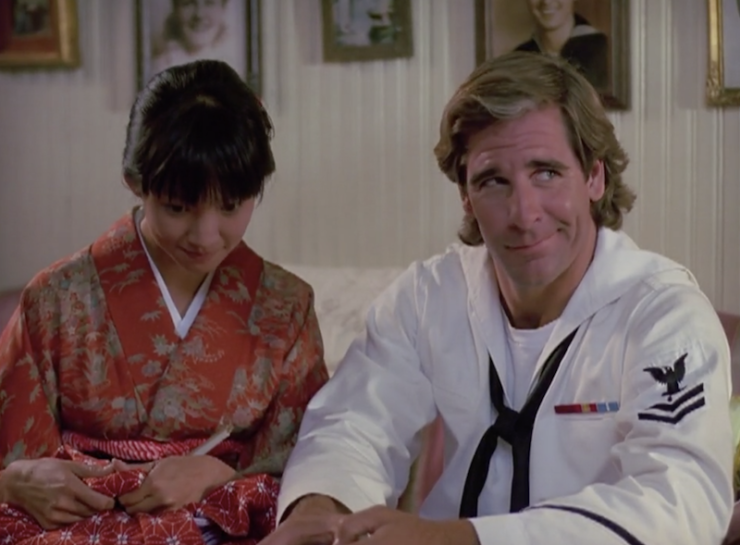
In “The Americanization of Machiko” Sam has to help his leapee’s Japanese bride win over his bigoted Midwestern mother. While Sam enthusiastically explains that American wives can be independent, and introduces her to baseball, he also muses that “she had a unique Japaneseness that [he] hopes she doesn’t lose”, and he successfully leaps not when Machiko begins to act more “American” but when his leapee’s mother wears a kimono as a peace offering to her new daughter-in-law. In “All Americans” the audience meets teenage Chuey Martinez, who’s one game away from earning a football scholarship to college. A few minutes into the episode we learn that he was born in Texas three days after his very young, very pregnant, unwed mother waded illegally across the Rio Grande to make sure he was born a citizen. Sam is flabbergasted, not at the idea of illegal immigration but at the woman’s bravery; Al Calavicci, war hero/astronaut, presents this as the ultimate American dream: “That’s the story with our country—mothers and fathers go through all kinds of hardships just to see that their kids get a better break than they had.”
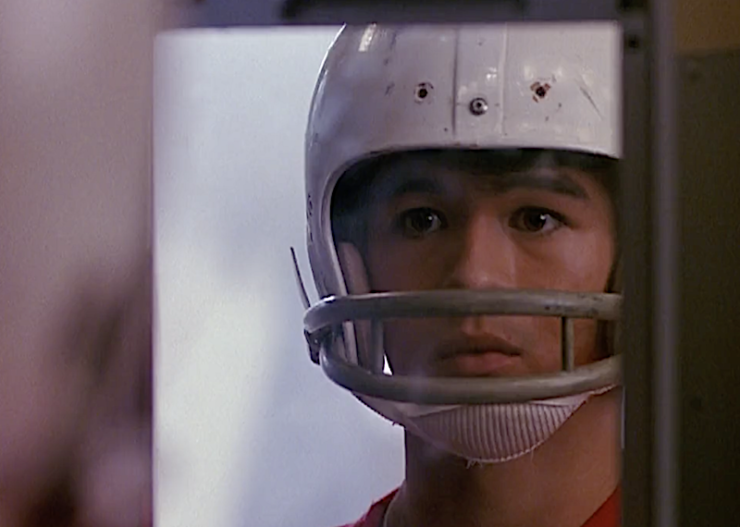
The entire premise of the show allows for a certain fuzzy spirituality, as the initial sci-fi conceit was hijacked by an unknown force that seemed to be the thing actually controlling Sam’s leaps. Sam and Al usually defaulted to referring to that force as God, and the show’s fans use the phrase “God/Fate/Time/Whatever” to cove all the bases. Because of this, the show is able to occasionally commit to being a spiritual Woobie, complete with in-show miracles (“A Single Drop of Rain”, “A Little Miracle”) or back off to be a little more science fictional (“Future Boy”, “Shock Theater”). Dr. Sam Beckett, however, becomes the people he needs to help. There is no distance for him, there is no heaven waiting for him, or acquittal from murder, or cure for gamma radiation—he just moves on to the next one. There’s no reward at all.
But if we follow this idea—G/T/F/W that was leaping Sam around didn’t discriminate. He leaped into KKK members, murderers, political assassins, as well as priests, rabbis, and abused chimpanzees. This wasn’t a pair of angels dropping in to comfort “terminally ill child of the week”, or a pair of white men observing other cultures from a distance, knowing they could end their journey and go back to a life of comfort any time they wanted. This was someone being dropped into every aspect of humanity, high and low, privileged and oppressed, who then had to deal with the consequences, never knowing when he’d leave, or if, or if the next leap would land him somewhere even worse. More so than any of the other Woobies, Sam Beckett can become a stand-in for any viewer who feels morally obligated to do difficult work. The show took a person who is already extremely compassionate and well-meaning, and made him a better person through experience. The real point of Quantum Leap is that no matter how good we are, we, and by extension this maddening nation, can always become better.
Originally published in February 2016, and again in July 2018.
Leah Schnelbach leaps from thinkpiece to thinkpiece, hoping each time that she’ll run out of things to say. Come call her a nozzle on Twitter!










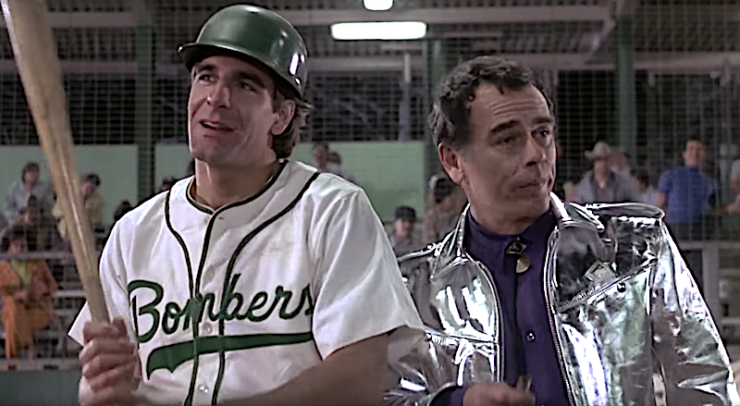
I loved this show although it annoyed me that the body Sam leaps into learns nothing and earns nothing of what Sam does for him.
Another interesting Woobie is GHOST WHISPERER which started just after 9/11. Its premise that there is justice beyond death was a very powerful message. At the same time, CSI’s premise of justice through science also provided comfort.
I loved this show but my God can we not look at things in this day and age without seeing it through victimization and political ideation?
Stevie, short answer – no.
Awesome show, story telling and actors. I dig how they influence real people when they were younger. So cosmic.
@1,
I always wanted to see what happened *after* Sam leapt out. Did the person continue whatever path Sam put them on? Or did the same things that got them into the situation that Sam fixed happen all over again?
@5
There was one episode where we got to see directly the positive effects of a life he saved because the present changed before Al’s eyes at a hearing. It was pretty nifty.
Since it wasn’t in the time of the article, I have to mention the JFK episode. Sam leaping into Oswald at several different points in his life and Oswald threatening to overtake Sam and force him to pull the trigger anyway was so amazing and tense, and the ending was such a great twist I don’t want to reveal here.
@1: I think the young woman Sam helped in “Raped” gained experience, as she had to come into the courtroom and speak the terrible details of her rape so that Sam could say them. No one could see or hear her but Sam and Al, but from her viewpoint she was standing in front of a courtroom full of people saying those words.
Do kind of wonder how she liked coming back to her body to find Sam had just used it to pound the crap out of her assailant. :)
Oh–can we have a Quantum Leap rewatch now? There’s a full series box set out on DVD now, so we can follow along pretty easily…!
Despite the similarities, I do not think that “The Color of Truth” was based on “Driving Miss Daisy.” The Quantum Leap episode was broadcast in May of 1989 and while the play opened in April of 1987, it was an off-broadway production that did not tour until 1988. (The movie has a limited release in December of 1989 with wide release at the end of January, 1990, so it was definitely not an influence). Since Quantum Leap had its first episode broadcast in March of 1989 and, allowing for production and post-production, the timing seems a little too short.
Things more American than Quantum Leap: (1) Capitalism (2) Representative democracy (3) Self reliance (4) Belief in a Supreme Being (5) Facing interenal and external threats with strength and not backing down.
I mean look I love quantum leap (though I thought the ending was a little weak) it was my introduction to silly but moving sci-fi and was a good counter point to the more serious star trek next generation but saying there is nothing more American than it – a little silly even for hyperbole.
@10. Some of your points are debatable, but belief in a supreme being definitely doesn’t belong there.
@2 and @10
If you think that QL was never about the stories of the marginalized nor about specifically America’s own foundational myths, then I don’t know what show you think you were watching but it was not Quantum Leap. The show was Americana and about how Americana often failed Americans.
What I thought would be neat is if the Quantum Leap people went back-stage at an Oldies concert – with a bunch of Rock Stars who are dead in our time-line. Preferably not naming them, but having them talking about having to play their old music.
And we have to also thank Sam Beckett (aided on this occasion by an actual angel!) for inspiring young Donald Trump in the 4th season episode “It’s a Wonderful Leap”.
I always thought one of the most powerful episodes was “Black on White on Fire,” where Sam leaps into an African-American medical student with a white girlfriend in Watts on the day the riot starts. When Sam finds out the date and wants to somehow stop it from happening, Al informs him that the triggering event has already taken place and there’s nothing he can do. So, Sam has to go through the day hanging out with his “host’s” friends and agonizing over what’s about to happen to them and unable to do anything–a classic “nightmare” scenario. And, once the riot starts, Sam gets brutally beaten by cops in what is arguably the worst physical damage he suffers during a leap.
A great bookend for the lead actor. I love how the opposite bookend of this sci-fi actor’scareer lead to the future as captain of NX-01 Enterprise. But even in that both shows deal with the past. One our present past and the other a future past.
great show
great show, wish my cable would show this
IIRC, the show ends with Sam Beckett still out there, helping America get better, one life at a time. I find that poignant and comforting. This piece has me choked up every time I read it and remember that show. It was great, corny and not at the same time. Scott Bakula and Dean Stockwell had great chemistry. It’s funny that with the current «golden age» of TV, I don’t think we’ll see shows like that anymore. That show is pretty much the antithesis of grimdark, very geeky at the same time and all of that with a side of the spiritual. The show lasted a few seasons so I suppose it must have done reasonably well in the ratings, but if someone was to pitch it to me the way I just described it, I’d give them some serious side eye. Sometimes we just get lucky in what makes it through on TV.
@Steve no. 2: “Can we not look at a show that’s explicitly about learning to empathize with victimized people and people caught up in political crises through a lens of victimization and political ideation?” Oh goodness gracious.
@20 the perfect vicious circle
Perhaps we can learn to see them as nothing but a bunch of losers?
This was such a great show. There were so many memorable episodes, even before it started getting cheesier at the end of its run with the “evil leaper” and the God vs Satan angle.
I remember a couple of back to back episodes where he jumps into his own boyhood self and convinces his older brother who’s leaving for Vietnam (and died there in Sam’s original timeline) to be careful because he’ll get killed over there. He manages to convince him he’s from the future and knows what will happen by playing him John Lennon’s “Imagine” on the guitar and telling him it’s a song he will release years later once the Beatles are broken up, and his brother agrees that it sounds like a Lennon song that doesn’t exist and that his little kid brother couldn’t have written himself, so he promises to be extra careful on his tour. In the next episode Sam leaps into a soldier serving in Vietnam with his older brother and actually helps him survive the war.
Great show and others have mentioned many of the great episodes but one of my personal favorites was Sam leap into Al’s life messing it up so that Dean Stockwell is replaced by Roddy McDowall. That switch worked on so many levels because both actors started acting as children.
@10, Don’t forget American Exceptionalism: The strange belief that the USA is somehow better than all other countries.
Not surprisingly, not a belief shared by any other countries :)
@25
Oddly enough, there are people in England (not Scotland, Wales or Northern Ireland) who also believe that. They tend to be to the right of the political spectrum.
@26,
Ironically, just the part of the political spectrum that cost them the colonies that became the US.
@25, Of course other countries don’t believe that of the US. They’re too busy believing it of themselves. I don’t know why people fail to understand that this is a common notion people have of the places they live.
@28/Kate: In my experience, most people don’t believe their country to be better than all others.
Some people idolize dead or current presidents or celebrities. My “idol”, if I were to idolize someone, would be Dr. Samuel Beckett, a man with Christ-like wisdom, compassion, and lack of ego. Quantum Leap, while unrealistic and sometimes bordering on corny, was a masterpiece of entertainment that addressed just about every modern social issue, so brilliantly and with such heart! I ache to live in a society where people think like Sam. What a joy living would be! In fact, I expected the world — or at least the U.S. — to be better today than it was yesterday; such strides were made in the sixties to that end. Sadly, most people are not anything like Dr. Beckett. Too many souls have left compassion, tolerance, and respect for others behind. It’s a “thing” now.. to be rude.. to harden the heart against the suffering of others.. and to care only about one’s own needs and desires. Quantum Leap attempted to “leap” human consciousness, but I look around me today and I see what appears to be just the opposite.
It’s been so many years since Quantum Leap aired, so I watched the series again as if for the first time. I discovered that bringing a loving soul like Sam Beckett into my living room gave me comfort.. a respite from a reality that is often hard to deal with. I wish we had more TV programs today that, like QL, have the perfect mix of depth and light-heartedness, drama and comedy — and less shows that involve murder, war, and revenge. My only criticism of Quantum Leap is the way in which it ended. (SPOILER ALERT: stop reading now if you plan to watch this show for the first time). Watching this beautiful man say, with tears in his eyes, “I just want to go home!”, and to be told that “Sam never got to go home”, was just soul-crushing!!
@29, JanaJansen, I remember many years ago seeing on television young Dutch saying they didn’t think there was anything special about the Netherlands. It broke my heart. Modern subjects of the country that pioneered Freedom of Religion and offered Shelter to the Pilgrum Fathers and my personal Marano ancestors think that’s nothing special? Not to mention the Netherlands contributuon to the arts, science and technology.
IMO you don’t think your country is special you are a very sad person.
@31/Roxana: Special as in unique, agreed. I’d say that about all countries. But better than all others? I wouldn’t say that about any country, including my own (which I quite like).